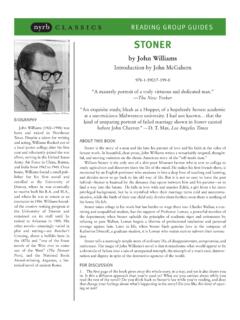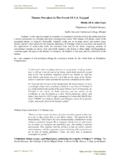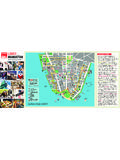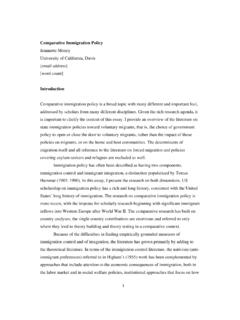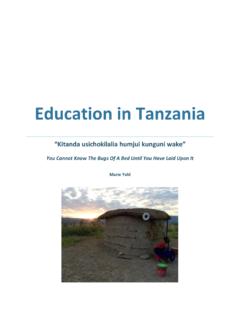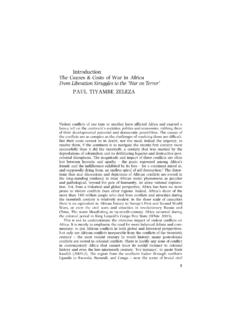Transcription of The Autobiography of an Unknown Indian Introduction
1 THE AUTOBIOGRAPHYOF AN UNKNOWNINDIANNIRAD BYIAN JACKNEW YORK REVIEW BOOKSCLASSICSTHE Autobiography OF AN Unknown INDIANNIRAD C. CHAUDHURI (1897 1999)was born in the town of Kishorganj in East Bengal in the year of Queen Victoria sDiamond Jubilee. His first book, The Autobiography of anUnknown Indian , was published in 1951 and was followed by many others, including The Continent of Circe, for whichhe won the Duff Cooper Memorial Prize, and Thy Hand GreatAnarch!, a second volume of memoirs. Chaudhuri moved toEngland in 1970. In 1992 Queen ElizabethII conferred uponhim the title of Honorary Commander of the British Empire. IAN JACK began his career in journalism in Scotland in the 1960s. For many years he was a reporter, editor, featurewriter, and foreign correspondent for the LondonSundayTimes, mainly in the Indian Subcontinent. He was cofounderand later editor of the Independent on Sundayand has editedGranta magazine since york review booksNew YorkTHE Autobiography OFAN Unknown INDIANNIRAD C.
2 CHAUDHURII ntroduction byIAN JACKThis is a New York Review BookPublished by The New York Review of Books1755 Broadway, New York, NY 10019, USAC opyright 1951 by Nirad C. ChaudhuriIntroduction copyright 2001 by Ian Jack All rights by arrangement with Macmillan Publishers of Congress Cataloging-in-Publication DataChaudhuri, Nirad C., 1897 The Autobiography of an Unknown Indian / Nirad C. Chaudhuri ; Introduction by Ian published: London : Macmillan, 0-940322-82-X (pbk. : alk. paper)1. Chaudhuri, Nirad C., 1897 2. Bengal (India) Civilization. Civilization 1765 1947. 4. Historians India Biography. A3 2001954'.14031'092 dc21 2001004271 ISBN 0-940322-82-X Cover photo: Raghubir Singh, Man Diving and Swimmers, Banaras, 1985 (detail) Raghubir SinghCover design: Katy HomansBook design by Lizzie ScottPrinted in the United States of America on acid-free 9 8 7 6 5 4 3 2 1 October CHANDRA CHAUDHURI lived for a very long time andwitnessed the decline of an empire completely, the whole run ofthe clockface, from imperial high noon to postcolonial he died, in Oxford, England, in August 1999, he was threemonths away from his 102nd birthday.
3 He had published his lastbook only two years knew him during his last two decades, as many others knewhim at that time, as a deeply mischievous and superbly entertain-ing egoist. It is impossible to exaggerate these aspects of his char-acter, which are also fully present in his writing. The word ego held no shame or fear for him. As he sometimes said, it was thebrute power of his ego that had driven him onwards and else would he have lived so long and productively? Hisphysique had nothing to do with it. He was always frail, with thebustling energy of a small bird, and never stood much more thanfive feet tall or weighed more than ninety-five pounds. His earlycircumstances were not promising. Birth and childhood in an ob-scure deltaic town in Bengal usually guaranteed the opposite ofWestern standards of longevity, nor did they offer any obviousroute to a literary career in the English language.
4 I am a strikingillustration of the survival of the unfittest, Chaudhuri would say. It comes from self-assertion through writing. Otherwise I shouldbe dead, or living on a clerk s pension in some foul Calcutta slum. Instead, and quite late in an average life span, he became India smost majestic and pungent writer of English prose, possibly thefinest Indian writer of English in the whole of the twentieth cen-tury (as one of his obituarists claimed), and certainly the finest in the first three quarters of it before the burst of Indian writ-ing in English that followed the publication of Salman Rushdie sMidnight s Children. (This is setting aside the artfully simple fiction of R. K. Narayan, which Chaudhuri had no time for an antagonism which was gently reciprocated by the almost equallylong-lived South Indian novelist.)
5 The Autobiography of an Unknown Indianwas Chaudhuri sfirst book and also his best. He wrote a dozen more: polemical histories and biographies, an account of his first visit to Britain (A Passage to England, 1959), and a second volume of autobiogra-phy (Thy Hand Great Anarch!,1987). All of them have their bril-liant rewards, but only in passages do they match the livelycourage and descriptive strength of this book, in which many ofhis later themes are s power as a describer speaks for itself in the pagesthat follow and needs no elaboration; he is a fascinating, ground-level witness and expositor of a vanished Indian way of life and ofwhat British imperialism, then at its height, meant to its humbleand not-so-humble subjects. The word courage, however, de-serves some context.
6 In this book, Chaudhuri is courageous in twoways: in his literary ambition and in the open declaration of hispolitical and historical beliefs. When he began to write The Auto-biography of an Unknown Indian , in 1947, he had no models. Theautobiographical form had almost no tradition in India and tendedto be the preserve of the famous; only two other indians of his era,Nehru and Gandhi, had tried it with any success. Chaudhuri wasthen quite genuinely an Unknown Indian , living modestly in Delhiand knocking out scripts for All India Radio during its transitionfrom British to Indian control. He was also suffering the crisis ofmale middle age. He was nearly fifty years old. He had wanted tobe a historian. He considered himself a failure. He would die quite soon, he thought without any achievement apart from hischildren.
7 Forty years later, in Thy Hand Great Anarch!, Chaudhuridescribes how the idea for the book came to him: It came in this manner. As I lay awake on in the night ofMay 4 5, 1947, an idea suddenly flashed into my , instead of merely regretting the work of history youcannot write, I asked myself, do you not write the historyyou have passed through and seen enacted before your viIntroductioneyes, and which would not call for research? The answer too was instantaneous: I will. I also decided to give it theform of an Autobiography . Quietened by this decision I fellasleep. Fortunately, this idea was not nullified by the de-plorable lack of energy which was habitual with me. Thevery next morning I sat down to my typewriter and drafted afew first pages took some time to write, but once Chaudhurihad fixed his key and tonality he was producing 2,500 words a day before and after his short two-hour shifts at the radio the spring of 1949, the book was finished; Chaudhuri reckonedthat the total number of days spent writing it came to nine later wrote that this exercise of will was helped by the in-toxication of recalling from half a century before his early life in East Bengal a place he hadn t seen for twenty years.
8 But thebook was also helped, or, more accurately, its mood somberly in-formed, by the large events that were shaking India while Chau-dhuri sat before his typewriter and re-created his life from 1897 to1921. The British Raj ended at midnight on August 14 15, 1947,when the Subcontinent was partitioned into an independent butshrunken India and a new state, Pakistan, the boundaries betweenthem decided by the religious majority, Hindu or Muslim, withinadjacent territories. East Bengal became the eastern wing of Pak-istan (now Bangladesh), so that the Hindu Chaudhuri s ancestralhome suddenly lay in a foreign and predominantly Muslim coun-try (he never went there again). With Partition there came waves of homeless refugees and savagery mass murder, rioting, andlooting, some of it in the streets of Delhi outside the writer s win-dow.
9 Mahatma Gandhi, of whose followers Chaudhuri took askeptical view, was assassinated in the city on January 30, there sat Chaudhuri tapping away at his book as his countrywas convulsed and transformed, writing with the consciousnessof decay and destruction all around me. The turmoil of India in 1947 48 doesn t wholly explain histheme of decay, however. Chaudhuri was an upper-caste Bengali,born the son of a lawyer in the town of Kishorganj in the district of Mymensingh in the year of Queen Victoria s Diamond Jubilee,Introductionvii1897. The British had a longer and deeper and more socially com-plicated impact on Bengal than on any other part of India. Theirfirst Indian capital, Calcutta, was located there; since the earlyyears of steam navigation, their steamboats had paddled up anddown the great delta formed by the Ganges and the Brahmaputra;coal mines were sunk and tea plantations established in the higherground; out of the lower came the cash crops of indigo, opium,jute, and rice.
10 A new kind of Indian arose: urban, professional orentrepreneurial, newspaper-reading, Anglophile, and almost in-variably high-caste Hindu the components of what has beencalled the first middle class in Asia. Out of this class, from the1820s onwards, came religious and social reform movements and acultural phenomenon known as the Bengali Renaissance, whichproduced painters, musicians, writers, and scholars. The firstIndian novel was a Bengali novel; the first Indian scientists wereBengali scientists; the first Asian to win a Nobel Prize(Rabindranath Tagore) wrote in Bengali. Calcutta, which had beenlittle more than a stockade at the beginning of the eighteenth cen-tury, grew to become the largest city in Asia by the end of thenineteenth. Bengalis could look in the mirror and consider them-selves the most educated, sophisticated people in India theFrench of India as some of them still with education and aspiration came nationalist agitation,and the British reaction to it.
